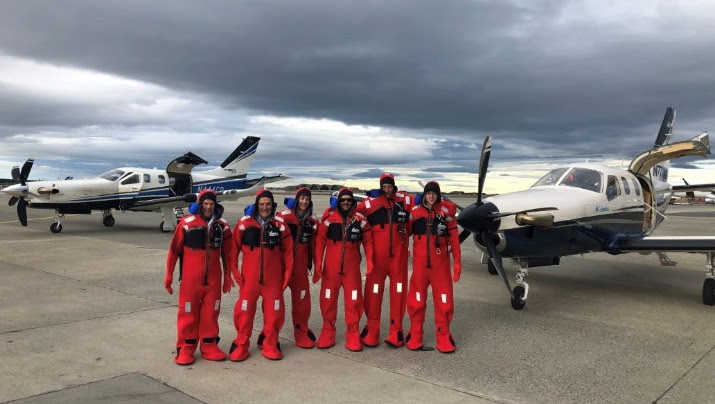Daher salutes the exceptional flights performed this month by owner-pilots on two TBM aircraft that traversed Antarctica and overflew the magnetic South Pole.
These achievements marked the first legs in earning the Polar Diamond Circumnavigator Diploma, recognized by the Fédération Aéronautique Internationale (the world’s governing body for aeronautical and astronautical records and sports), which has only been awarded once before.
One of the TBM owner-pilots – Sebastian Diaz from Santiago, Chile – reunited three generations of pilots in flying his TBM 850 with Diaz’ father, 88-year-old Patricio (one of the oldest still fully-licensed TBM pilots); and Sebastian’s son, Sebastian Jr., as copilots.
The other TBM owner-pilot, Dierk Reuter from Chicago, USA, was flying with son Alex on his TBM 930, carrying cameras and an inflight tracking system benefitting from an Iridium GO! satellite connectivity device and support of Iridium Communications. In-flight photos were posted to Instagram in quasi real-time using Iridium messaging and software created by the Reuters.
The 2,700 nautical mile trip for both aircraft from Santiago, Chile, to 75° South – the latitude required for the polar circumnavigator diploma – required three stopovers and much preparation, as Antarctica offers some of the most challenging environments for aviators. The temperature averages -56°F (-49°C) with constant winds.
Both TBMs had to fly over the huge continent – nearly 5 million square miles (12.9 million square kilometers) in size, largely uninhabited and mostly covered in ice. In addition, central Antarctica presents high ground that rises to more than 8,000 feet (2,500 meters), with peak mountains reaching 16,050 feet (4,892 meters) – where clear blue skies can quickly turn to overcast whiteout conditions.
On January 1, the two TBM aircraft left Punta Arenas in Chile: destination Teniente Rodolfo Marsh Martin Airport on King George Island (part of Chile’s Antárctica commune in Antarctica, and the continent’s northernmost airport). This airport serves the nearby village of Villa Las Estrellas and Base Presidente Eduardo Frei Montalva – the most important Antarctic base of Chile – with a 4,232-foot (1,290-meter) gravel runway.
On January 2, both TBMs continued to the British Antarctic Survey Sky-Blu base, at 807 nautical miles southwest, and reached the 75° South latitude turning point before returning to King George Island’s airport. On the way, TBM 930 owner Jim Baum arranged a fly-by of the National Geographic Orion – an ice-class exploration ship, enabling exciting pictures and video to be recorded.
“We are impressed by the airmanship of such TBM owner-pilots as the Diaz family and Dierk Reuter, who carefully prepared this dual polar expedition,” commented Nicolas Chabbert, Senior Vice President of Daher Airplane Business Unit. “We salute the confidence they have in our TBM very fast turboprop aircraft, as they had to face extreme weather conditions flying over one of the world’s most hostile regions.”
Dierk Reuter explained: “The journey from my hometown Chicago to 75S 71W and back can be summarized in figures: 18,782 nautical miles, 64 hours, 3,080 gallons of jet fuel, and 19 stopovers. But it doesn’t tell the story about a pilot’s feeling to fly over the South Pole. The TBM is an awesome aircraft to explore the globe!”.
Added Sebastian Diaz: “We also had the challenge of avoiding the freezing of the fuel because of the extreme low temperatures, for which we used more Prist [fuel system icing inhibitor] than usual. We also like to thank the Chilean Air Force for their generous hospitality at SCRM (Base Presidente Eduardo Frei Montalva).”




